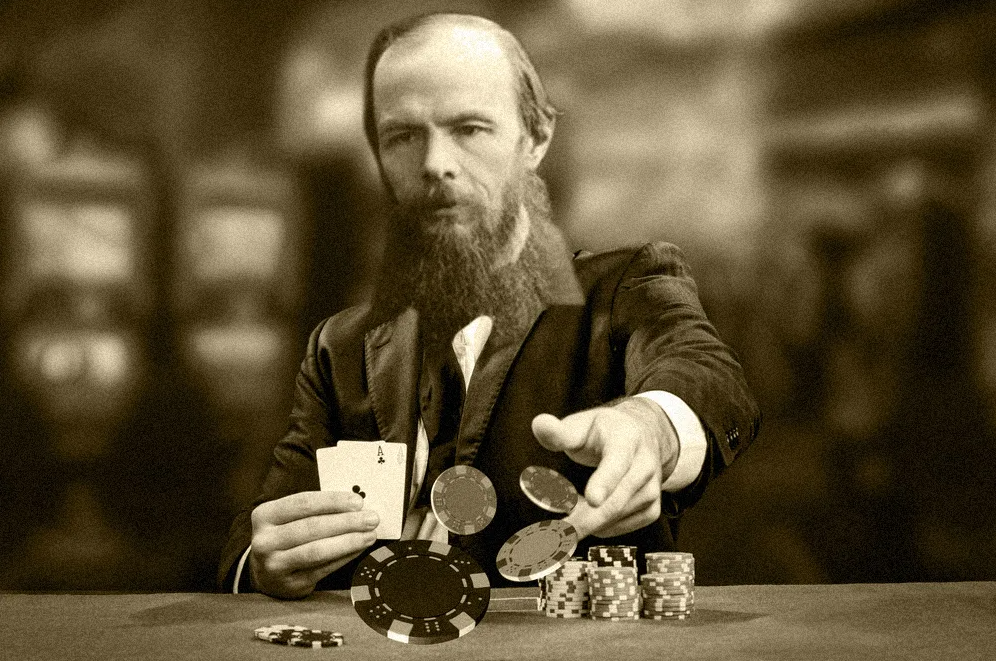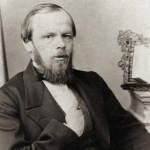
13.01.2023
Dostoevsky himself admitted that he plays roulette. In 1862-1863, the writer went to Europe for the first time, lost heavily and overwhelmed friends with requests to send money.
Legend 1. Dostoevsky was a passionate gambler
Verdict: It’s true
He didn’t have enough for a game, for a trip to another city, even for food. Maria Dmitrievna, his wife, received an alarming letter from Dostoevsky that he would be able to get from Turin to Rome only by pawning his watch. He traveled from Homburg to Dresden at someone else’s expense: his girlfriend and mistress Apollinaria Prokofievna Suslova had to pawn a chain and a watch. Going on the next trip abroad with his second wife, Anna Grigorievna, he visited the casino so often and unsuccessfully that he pawned her clothes, jewelry, and several times even an engagement ring. He pawned and redeemed his own eight times.

It is believed that the passion for gambling suddenly appeared in Dostoevsky in the 1860s. But the writer started playing much earlier. Most of the documentary evidence has been preserved about his addiction to roulette, but several letters indicate that he was gambling in his youth. In 1843, after losing at billiards, Dostoevsky accumulated so many debts that it took about a thousand rubles to pay them.
Legend 2. Therefore Dostoevsky was practically a beggar
Verdict: it’s almost true
He brought himself to poverty not only by gambling. Large debts began to accumulate with him from the mid-1860s. Then the brothers Fyodor and Mikhail Dostoevsky began to publish the magazine “Time”, spending a substantial sum on it. In 1863, the magazine was closed due to an unreliable article “The Fatal Question” – debts abruptly increased. Soon Mikhail died, and Fedor had to deal with financial difficulties alone and take care of his widowed daughter-in-law and nephews.
Dostoevsky did not know how to earn at all — here he was like his heroes, unable to live on a salary, boarding school, or at least save money wisely. He lived by writing, and his fees for publications in magazines were very modest. Until the mid-1870s, Dostoevsky received 150 rubles for a printed sheet. For comparison: Count Leo Tolstoy was paid 500 rubles.
Legend 3: Dostoevsky was sentenced to death, but he was pardoned on the scaffold
Verdict: It’s true
Dostoevsky was sentenced to death for participating in the Petrashev circle. The head of this association, Mikhail Butashevich-Petrashevsky, was accused of “plotting to overthrow the state system”.
Dostoevsky himself — that he distributed copies of Belinsky’s letter to Gogol, where the critic, as indicated in the materials of the criminal case, “analyzing the situation of Russia and the people, first spoke about the Orthodox religion in indecent and impertinent expressions, and then about the judiciary, laws and authorities.” Dostoevsky also turned out to be guilty of not informing about the meeting where another Petrashevite, Nikolai Grigoriev, read his essay “Soldier’s Conversation” with recommendations on how to overthrow the tsar.

As a result, Butashevich-Petrashevsky, Dostoevsky, and 19 other members of the circle were sentenced to death.
The convicts were brought to the square, where they were to be shot. According to the procedure, they were taken out to the pillars in threes. The imperial pardon and the decision to replace the execution with other types of punishment were already ready, but the Petrashevites were not informed about this. The authorities decided to play a little show and, as if really to carry out the execution.
Legend 4: Dostoevsky was hated by other writers
Verdict: this is a half-truth
Back in the 1840s, the young Dostoevsky, who had just written “Poor People”, got into Belinsky’s circle and could not make friends with Turgenev, Nekrasov and Panaev. They began to mock: in the above-mentioned “Belinsky’s Message to Dostoevsky” they called him a pimple on the nose of literature, and Turgenev spread a rumor that Dostoevsky demanded to single out “Poor people” in the “Petersburg Collection” with a golden border.
It was fiction, but it seemed plausible. All the ridicule had a common plot: Dostoevsky considers himself better than other writers and requires special treatment.
The enmity with Turgenev that arose then persisted for many years, although it did not seem to interfere with their economic relations: Turgenev was published in Dostoevsky’s magazine in the 1860s, and Dostoevsky later borrowed money from him.
In order not to quarrel with Dostoevsky, it was possible not to get acquainted with him and only read his articles and novels. So Leo Tolstoy did: I didn’t meet the writer personally, but I appreciated his texts.




